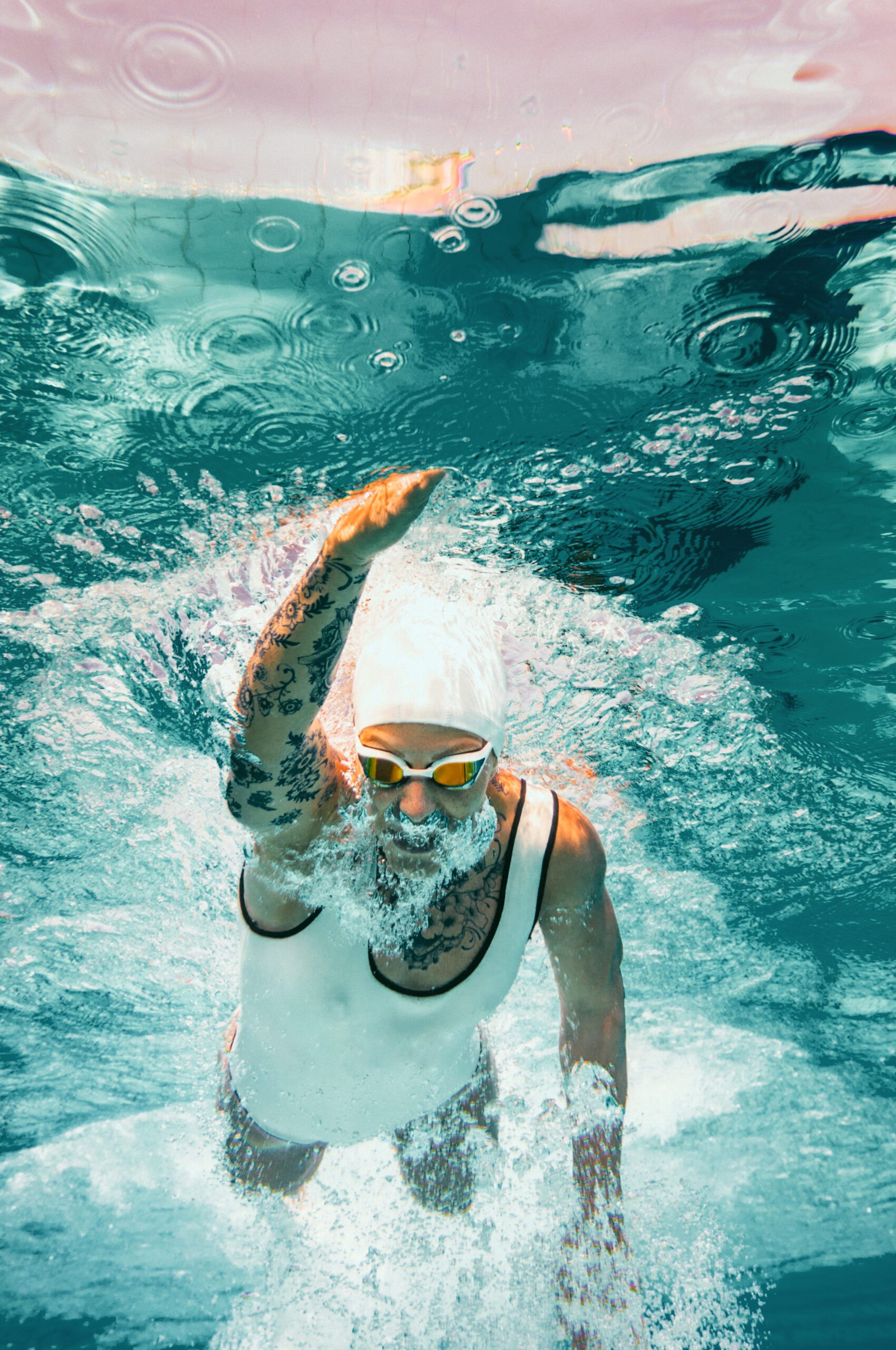Swimming, an age-old activity cherished across cultures and generations, captivates people of all ages with its unique blend of physical fitness, recreation, and serenity. Whether it’s gliding through a serene lake, splashing in the ocean waves, or racing laps in a pool, swimming offers something for everyone. In this blog post, we’ll explore the many facets of swimming, from its health benefits to tips for beginners, the exhilarating world of competitive swimming, and its profound impact on mental well-being.
The Health Benefits of Swimming
1.
Full-Body Workout
Swimming is an excellent form of exercise that engages nearly all the muscles in the body, providing a balanced workout that enhances strength, endurance, and flexibility. Unlike many other forms of exercise, swimming is a low-impact activity, making it easier on the joints while delivering a calorie-burning workout.
2.
Cardiovascular Fitness
Regular swimming improves cardiovascular health by enhancing heart and lung function. As swimmers increase their endurance, they reduce the risk of heart disease, high blood pressure, and other related conditions.
3.
Weight Management
Swimming calories can help burn substantial calories depending on the intensity and duration of the session. It’s an effective way to maintain or reduce body weight while toning muscles.
4.
Increased Flexibility
Routine swimming sessions promote flexibility, as the various strokes require a full range of motion. This improved flexibility can lead to better overall fitness and reduced injury risk.
The Mental Benefits of Swimming
1.
Stress Relief
Swimming can be a powerful stress-reliever. The rhythmic nature of swimming, combined with the soothing properties of water, creates an ideal environment for relaxation. Many swimmers find that moving through water helps them clear their minds, making swimming a meditative experience.
2.
Boosting Mood
Physical activity releases endorphins—often referred to as “the feel-good hormones.” Swimming can elevate mood, decrease feelings of anxiety, and combat depression. Whether you’re swimming alone or with friends, the experience often leaves you feeling energized and exhilarated.
3.
Mindfulness and Focus
Swimming requires concentration, allowing you to shift focus away from daily stressors and immerse yourself in the present moment. This mindfulness can enhance mental clarity and boost overall well-being.
Tips for Beginner Swimmers
If you’re new to swimming, here are some helpful tips to get started:
1.
Start with the Basics
Before diving in, familiarize yourself with the basics of swimming, such as floating, kicking, and breathing techniques. Consider taking beginner-level swimming lessons to build confidence and acquire essential skills.
2.
Choose the Right Gear
Invest in a good-quality swimsuit, swim cap, and goggles for comfort and visibility. Good-fitting towels and flip-flops for changing areas will enhance your swimming experience.
3.
Take Your Time
Don’t rush into swimming laps. Start with shorter sessions, gradually increasing your time and distance as you build stamina and comfort in the water.
4.
Practice Proper Technique
Focus on improving your swimming technique, including your strokes, breathing, and turns. Proper technique not only helps you swim faster but also reduces the risk of injury.
5.
Stay Hydrated
Even in the water, it’s essential to stay hydrated. Remember to drink water before, during, and after your swim to maintain your energy levels.
The Competitive Side of Swimming
For those who thrive on competition, swimming offers a comprehensive pathway to competitive events. From high school swim teams to collegiate programs and international competitions, there are vast opportunities for enthusiastic swimmers.
1.
Different Swimming Styles
Competitive swimming includes various strokes and distances, such as freestyle, butterfly, breaststroke, and backstroke. Each stroke has its techniques and strategies, allowing swimmers to find their strengths.
2.
Training Regimens
Swimmers require discipline and commitment in their training regimens. Many competitive swimmers engage in rigorous workouts that combine in-water practice with strength training, flexibility exercises, and dry land workouts.
3.
Tournaments and Competitions
The world of competitive swimming culminates in prestigious events such as the Olympics and world championships. Competing at this level not only showcases exceptional skill and dedication but also fosters camaraderie among swimmers from diverse backgrounds.
The Swimming Community
One of the most rewarding aspects of swimming is the community that surrounds it. From local swim clubs to international competitions, swimming provides opportunities to connect with like-minded individuals who share the same passion.
1.
Clubs and Teams
Joining a local swim club or team enhances your skills while promoting camaraderie and friendship. Working together towards common goals helps foster a supportive environment for swimmers of all ages.
2.
Events and Social Gatherings
Many communities host swim meets, charity events, and social gatherings centered around swimming, allowing participants to celebrate achievements and connect with others in the sport.
Conclusion
Swimming is much more than just a method of exercise; it’s a multifaceted activity infused with health benefits, mental wellness, and community spirit. Whether you opt for leisurely swims, competitive training, or family fun at the beach, swimming offers numerous opportunities to enrich your life. So, dive in, make waves, and discover the joy of swimming!
At MyEventArtist, we celebrate the sport of swimming through custom designs and branding solutions that capture its essence. Explore our design services at myeventartist.com, and let us help you showcase your passion for swimming!
Feel free to adjust any sections or personalize the content further based on your target audience or specific themes you want to highlight!



Leave a Reply